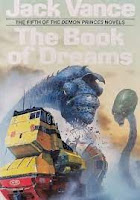We've done it, reached the fifth and final book in the Demon Prince series, The Book of Dreams (1981). The series has taken us from secretive evil to killing machines, subtle authoritarianism to petty egoism. Where then does The Book of Dreams take us? To deep-seated childhood issues...
The fifth and final demon prince for Kirth Gerson to take down is Howard Alan Treesong. When an anonymous person submits a photo to Gerson's magazine claiming to feature Treesong, Gerson uses his position to start a contest to name all the people in the photo. Throughout the days that follow, most of the people are identified. But a couple remain enigmatic—people known by multiple names. One entry takes Gerson to a distant planet, and deep into the past of Howard Alan Treesong. Question is, is it deep enough to stay alive and get revenge?
I hesitate to use the word “Freudian”. The Book of Dreams is not a psychological analysis of its antagonist. But more than any other book in the series, Vance tries to get into the villain's head via his childhood. On top of events and circumstances as a teen, the reader also gets a view into the title, literally Treesong's diary as a young man titled “The Book of Dreams”. While certainly pretentious were this novel Literature, Vance handles the topic in appropriately plot-centric fashion. It is a means to a way, i.e. revenge, and any parallels to real world psychoanalysis are simple.
It's probably unfair to be critical of the ending. Without spoiling anything, the book ends exactly as the previous four did. But after five novels, including Gerson's rumination over his position in life, as well as his difficulty with relationships, as well as the completion of his overarching mission, the reader may expect a little more than what is given. There is no series' length coda to square the whole. While not something to explicitly shake a finger at Vance for doing, it nevertheless leaves something to be desired considering the reader has just spent five novels in Gerson's shoes.
In the end, The Book of Dreams closes the Demon Prince series in stronger fashion than it began. Published a decade and a half after The Star King, first book in the series, Vance applies a stronger sense of personal style, as well as better technique. While digging into the head of his antagonist in semi-Freudian fashion, he does not, however, take advantage of the situation to dig into the head of his protagonist. The person readers have been shadowing for five revenge missions receives essentially the same treatment he had in previous novels—an untaken opportunity that could have added a layer of welcome complexity. But again, this book, with the color (literal and figurative) Vance injects, is a more welcome read than the first three Demon Prince novels, and a reasonably good note on which to close the series.


"the reader has just spent five novels in Gerson's shoes" <-- True, but I view Gersen as a rather bland "straight-man" beside whom the other characters in the story can shine. Vance had fun providing readers with a cast of amusing supporting characters including Ailett Mayneth and Tiptoe the Feek on the planet New Concept, Alice Wroke and Mrs. Ench for the contest, Maxel Rackrose and Dwyddion of the Institute, Ledesmus Hardoah and Professor Kutte on Moudervelt, Tuty snd Otho Cleadhoe on Bethune Preserve, and of course Treesong.
ReplyDeleteThat's an interesting point, and one that seems to have common sense in it. At the same time, I also think Vance tried to portray Gerson as a clever person, someone who is typically one step ahead in his quests for revenge. In other words, one of the motivations for reading his story is learning how he stays one step ahead. But the real reason I think readers deserved more is the roughly three occasions Vance went out of his way to get under the skin of Gerson's psyche regarding the larger meaning of his revenge quest. In Killing Machine and Palace of Love, for example, the reader learns of Gerson's doubts as to his ability to have meaningful relationships, as well as his purpose in life after completing his revenge against the 5 princes. The close of Book of Dreams doesn't give readers closure to either of those things. We assume he falls back on his wealth to retire in luxury, but it's never stated. And as to relationships, that is also left wide open. Not to say he needed a buxom blonde to make the happy ending replete, rather some decision as to what he considers his future in society.
DeletePerhaps Vance's villains do shine brigher for Gerson's dullness, regardless I still think the reader was owed a touch more on his personal life - just a touch. :)
I really wish the ended had been expanded upon -- I was actually shocked that I was left without answers regarding things like what Gersen would do next, and what would happen with him an Alice. It was also rather strange to me how each novel introduced a new female of fascination and then succinctly dropped them.
ReplyDeleteThanks for the review and your insights
As you see in the comments above, Vance was critiqued for this. I will not defend him, but I think I can explain.
DeleteHe was writing with an episodic mindset, i.e. carry over between stories was minimal. Each book could be picked up and read independently. Secondly, Vance did not know how/did not want to write reltationships/romance/women. I've read everything by Vance, and I believe there is a total of two female main characters (out of 100+ stories). His focus was plot, plot, plot, leaving us to wish for more - especially after five books of revenge. What's next? We'll never know.